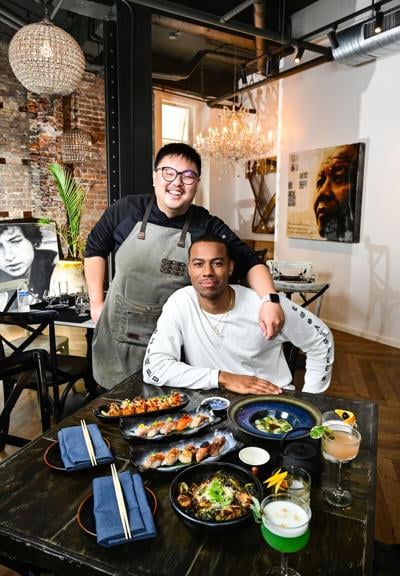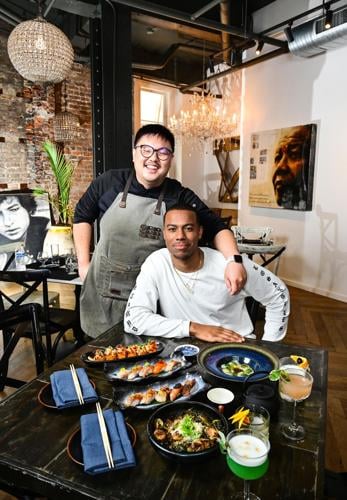It takes 10 years to become a head sushi chef in Japan.
Chef Matthew Nguyen has passed that milestone, spending the past 14 years mastering his craft.
Nguyen understands that sushi is an art so precise that every detail counts, from the texture of the rice to every cut of the knife. That is one reason why, at 31, he has his own restaurant, Kenji Omakase, in the International House Hotel. The other reason is a bit of luck.
Kenji opened late last year for omakase dining, typically featuring 16 courses chosen by the chef for $135. Now Kenji offers an a la carte menu, making it possible to order a trio of sashimi for $18, the Rush Hour maki that combines tempura-fried shrimp with seared wagyu for $21, or five pieces of aged Japanese fish for $40.
“We wanted to make our sushi more accessible,” Nguyen says. “If someone wants hand rolls and a glass of sake, they can have that.”
How the young chef became an itamae, or head sushi chef, in his own restaurant is a story of grit, commitment and kismet. He remembers going to the old Oki Nago in Metairie for the sushi buffet and hibachi. Although he didn’t start eating raw fish until he was 15, the flavors hit him hard.
“Like so many people, California rolls were my gateway,” he says. “I just knew I wanted to be a sushi chef.”
After losing both his parents, he spent some time in Texas with family. At 17, his first job was at a conveyor belt sushi restaurant. A job at Uchi in Dallas showed him that there was more to sushi than spicy mayo and snow crab. Back on the Gulf Coast, he worked at the IP Casino in Biloxi and Ninja and Rock-n-Sake in New Orleans. He also did a stint at Omakai Sushi in Miami, where he met executive chef Aaron Pate.
“He was my mentor,” Nguyen says. “He taught me how to treat fish.”
While working as head chef at Yakuza House, he prepared sushi for Malachi Dupre, the former LSU and NFL player. That’s where the luck factored in.
“Because I’ve traveled so much and spent time in L.A., I know authentic sushi when I see it,” says Dupre, who like Nguyen grew up in New Orleans East.
“There are good Japanese restaurants here, but it’s hard to find a chef making things the traditional Japanese way, letting the fish speak for itself,” Dupre says. “I didn’t know Matt, but within five minutes, I saw that he really knew fish, his knife work was excellent and he had a passion for it. I knew chef Matt deserved a platform of his own. A blank canvas.”
Dupre wanted to back him in a restaurant, with the additional support of his friend Sean Cummings, who is a neighbor at the Rice Mill Lofts in Bywater. Cummings is the owner of the International House hotel, with its Loa bar powered by bar chef Abigail Gullo. She curates special cocktails to pair with Kenji’s menu.
“I was raised to always try to be the best,” Nguyen says. “I’m still young and I have a lot to learn. When Malachi said he’d back me, I had an immediate thought of what could be. He and Sean backed me up the whole way. I went from working under people to co-owning my own restaurant. It is a dream I’ve had but wasn’t sure how to attain. This changed my life.”
Kenji occupies a space off the hotel lobby that has been home to several restaurants. The modern rectangular space is dominated by the 14-seat sushi bar, and there are crystal chandeliers, a long communal table and table and couch seating. On the walls are striking mixed-media portraits of icons including Mick Jagger, Jackie Robinson and Nelson Mandela.
Bertie's Intergalactic serves a changing menu of 'stoner food meets French technique.'
There is art on the plate too, thanks to the chef’s precision and vision. Hand rolls and signature makis are exceptional, stuffed with bluefin tuna, ora king salmon, whitefish and amberjack. Most of the imported fish is aged in a humidity-controlled case, a process which delivers a silkier, denser mouth feel.
The menu’s small plates include both cooked and raw items, such as an 8-ounce Maine lobster tail, served tempura style with greens. Crispy Japanese rice provides a crunchy platform for slices of velvety whitefish with truffle oil and habanero aioli, or spicy tuna brushed with a four-year aged soy sauce and nibs of crunchy garlic.
The restaurant offers Japanese beer, sake and wine along with cocktails like the Japanese magnolia, Gullo’s take on a lychee martini, made with her own magnolia blossom cordial. Dupre’s brother Vernon Dupre provides ESV tea, his own blend of whole leaf peppermint, orange peel and ginger tea.
The name Kenji means second son in Japanese.
“As the middle child in my family, that resonated with me,” Nguyen says. “This restaurant is an ode to my late parents, a way to show them respect by doing my best every day.”






